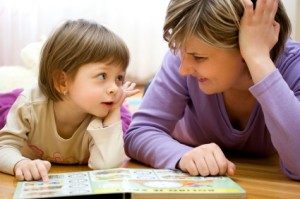 People differ in the way they parent their children, and both researcher have identified various parenting styles that tends to be the most common in our society. However much like personality traits and other category based summaries of human traits and behaviours, it might be a case that you show elements of the different parenting styles at different times . And often when faced with challenging behaviours or parenting situations that elicit a strong emotional response in you (in either direction) many parents find themselves in engaging in behaviours associated with a parenting style that they would not usually choose to engage in.
People differ in the way they parent their children, and both researcher have identified various parenting styles that tends to be the most common in our society. However much like personality traits and other category based summaries of human traits and behaviours, it might be a case that you show elements of the different parenting styles at different times . And often when faced with challenging behaviours or parenting situations that elicit a strong emotional response in you (in either direction) many parents find themselves in engaging in behaviours associated with a parenting style that they would not usually choose to engage in.
Please read through the pros and cons of three main parenting styles that have been identified- Authoritarian, Permissive and Authoritative:
Authoritarian Parenting is high on demandingness: emphasizing obedience, stern discipline, high achievement expectations, and micromanagement of children’s behaviours. This type of parenting is low on responsiveness to the child’s needs though with the use of punishment to control behaviour, or too much adult instruction (“hovering”) limiting the child’s opportunity to develop independence and self-confidence. Other names for this type of parenting style include: Tiger parenting, French parenting, Helicopter parenting, and sometimes Attachment parenting when viewed as a style in which the parent is unable to separate from the child.
Pros: Children raised by authoritarian parents can be productive, responsible and motivated. Parents are in a position to foresee potential problems their child may be faced with in life and act protectively. Children can experience early achievement and success in goal-directed activities. These children are usually well-behaved.
Cons: The effect of authoritarian parenting on children can be that children struggle to manage life situations by themselves, have low self confidence, and lack emotional resilience. They can be fearful and highly vulnerable to mental health issues such as depression and anxiety. Such children can become over-dependent on their parents, or feel restricted by their parent’s control. There is also the risk of these children relying upon success as an indicator of happiness.
 Permissive Parenting is characterised by emotional warmth and high responsiveness to a child’s needs, but lacks boundaries and rules which guide children in their learning and behaviours. Other names for permissive parenting include: jellyfish parenting, nurturant parenting, snowplough or bulldozer parenting (although this can also be authoritarian sometimes), or indulgent parenting.
Permissive Parenting is characterised by emotional warmth and high responsiveness to a child’s needs, but lacks boundaries and rules which guide children in their learning and behaviours. Other names for permissive parenting include: jellyfish parenting, nurturant parenting, snowplough or bulldozer parenting (although this can also be authoritarian sometimes), or indulgent parenting.
Pros: Permissive parenting can lead to children with higher self esteem and lower risk of mental health issues such as depression and anxiety. Children learn to rely on their own decisions, have more autonomy and independence. Such parents are warm and affectionate with their children, and highly atuned to their children’s immediate needs.
Cons: Children raised under permissive parenting may be demanding, insecure and lack direction in life due to the poor boundaries or guidelines provided by their parents. They may have difficulties with self control in settings that have rules, and be vulnerable to involvement in problem behaviour (e.g. drug taking). They are also less driven to achieve at school. When children are given too much autonomy too soon, they can find themselves in situations that risk their safety.
 Authoritative Parenting is high on demandingness in that there are rules and boundaries, and expectations of their children’s behaviours. Such parents are also high on responsiveness in that they encourage their children to think for themselves, be creative, and develop independence with the parent using guidance rather than punishment. This type of parenting is generally considered to be the most flexible and have the best outcomes for child development. Other names for this style of parenting are dolphin parenting, positive parenting, equalitarian parenting, spiritual parenting, free-range parenting (sometimes considered permissive), and attachment parenting (in its original form as described by W Sears).
Authoritative Parenting is high on demandingness in that there are rules and boundaries, and expectations of their children’s behaviours. Such parents are also high on responsiveness in that they encourage their children to think for themselves, be creative, and develop independence with the parent using guidance rather than punishment. This type of parenting is generally considered to be the most flexible and have the best outcomes for child development. Other names for this style of parenting are dolphin parenting, positive parenting, equalitarian parenting, spiritual parenting, free-range parenting (sometimes considered permissive), and attachment parenting (in its original form as described by W Sears).
Pros: Whilst authoritative parents have high expectations and enforce rules with their children, they are better at being clear about the reasons behind such guidelines, open to negotiation, and flexible. Children with such parents are encouraged to be involved with the family, have increasing autonomy with age, and have opportunities to learn from their mistakes in a supported environment. Such children are generally well behaved, socially competent, and accomplished academically. They are provided with opportunities to build self confidence, flexibility, and respect.
Cons: This parenting style requires periodic reviewing of expectations and family rules as children develop and mature. Also, due to the flexible nature, parents may find themselves in situations in which they don’t know how to respond. It can be difficult to maintain when faced with children with challenging behaviours or personalities.
Some parents consciously adhere to particular parenting styles, whilst others gravitate toward an approach that works at the time. Parenting styles are influenced by culture, our own experiences of being parented, and societal expectations. Many parents find they use a mixture of parenting styles dependant on their childrens’ personalities and stages of development, their partner’s parenting style, and their own comfort zones. You may look at the pros and cons of each parenting style and conclude that whatever style you use, you are going to mess up your kids. Bear in mind though that parenting styles are generalisations that, although they are interesting in showing trends, don’t take into account the complexities of individual families.
If you are concerned about your parenting, your current style is not working, or your style is in conflict with that of your partner, it may be helpful to talk with one of our psychologists.
